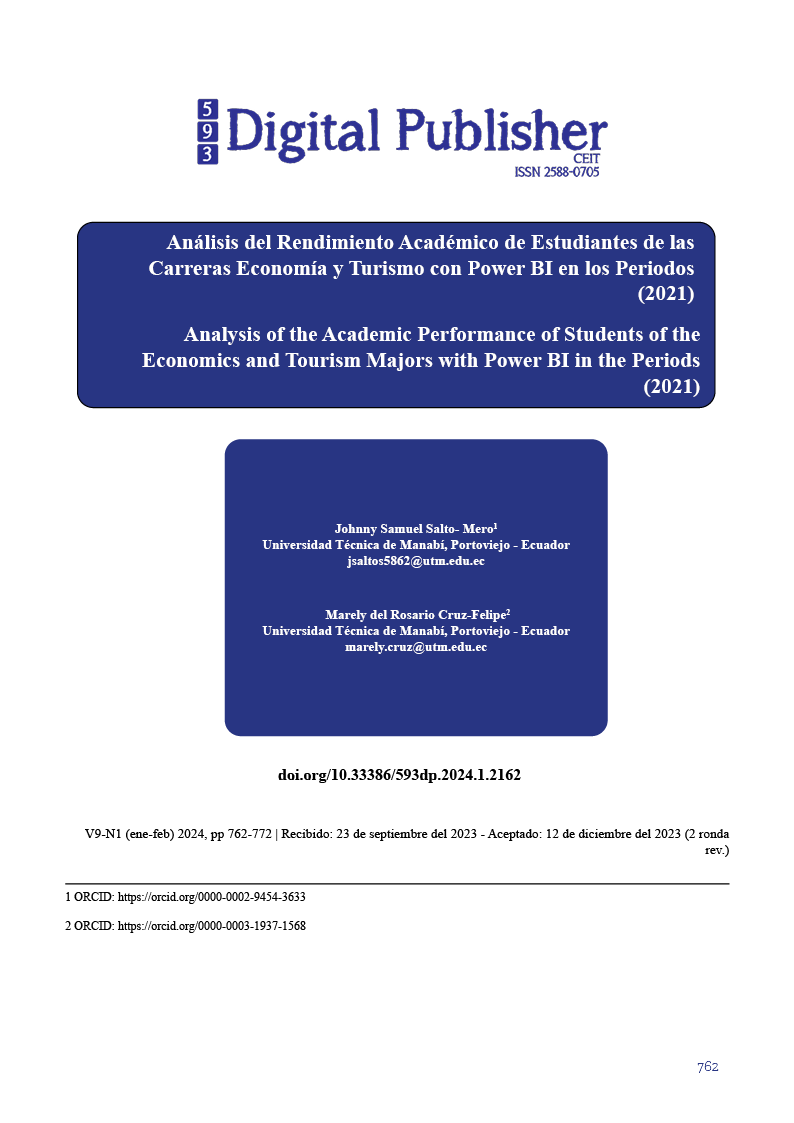Analysis of the academic performance of students of the Economics and Tourism majors with Power BI in the periods (2021)
Main Article Content
Abstract
In the university world, there is great relevance in obtaining precise data where academic performance of students can be evaluated since it is a topic of great interest. Many times, the process becomes a bit tedious and complicated to reach a study object. The advantage of using tools for the analysis of academic performance of students is that it provides objective and precise data, which allows identifying areas of improvement, taking measures to address them, quick and efficiently dealing with processes required to handle large flows of data. The selected methodology, CRISP-DM, includes the execution of six stages: understanding the business, understanding the data, data preparation, modeling stages, evaluation, and deployment. Once the database is analyzed, variables and data filters are defined, and finally, the execution of automatic learning algorithms (Decision Tree, Random Forests, Neural Networks, Support Vector Machine) is carried out to obtain academic performance of students using Python language. The objective of this article is to perform an analysis of academic performance in Economics and Tourism students at the Technical University of Manabi for which different algorithms were evaluated, obtaining that the most efficient algorithm is the Random Forest giving precise values, allowing to obtain a dashboard with student statistics.
Downloads
Article Details

This work is licensed under a Creative Commons Attribution-NonCommercial-ShareAlike 4.0 International License.
1. Derechos de autor
Las obras que se publican en 593 Digital Publisher CEIT están sujetas a los siguientes términos:
1.1. 593 Digital Publisher CEIT, conserva los derechos patrimoniales (copyright) de las obras publicadas, favorece y permite la reutilización de las mismas bajo la licencia Licencia Creative Commons 4.0 de Reconocimiento-NoComercial-CompartirIgual 4.0, por lo cual se pueden copiar, usar, difundir, transmitir y exponer públicamente, siempre que:
1.1.a. Se cite la autoría y fuente original de su publicación (revista, editorial, URL).
1.1.b. No se usen para fines comerciales u onerosos.
1.1.c. Se mencione la existencia y especificaciones de esta licencia de uso.
References
Martos, S. (2018). Visualización y análisis de métricas de desarrollo y mantenimiento en productos software. Etsinf, 64.
Arteaga, W., & Sandoval, J. P. (2018). Factores que intervienen en el rendimiento académico en la Universidad. Acta Nova.
Basto, R. (2017). La función docente y el rendimiento académico: Una aportación al estado del conocimiento. Comie.
Bedregal, N., Tupacyupanqui, D., & Cornejo, V. (2020). Análisis del rendimiento académico de los estudiantes de Ingeniería de Sistemas, posibilidades de deserción y propuestas para su retención. Ingeniare.
Céspedes, B. (2022). Aplicación del algoritmo del bosque aleatorio a un modelo de clasificación de la anemia en niños peruanos. Mediciego.
Díaz, M., Ahumada, M. d., & Melo, J. (2021). Árboles de Decisión como Metodología para Determinar el Rendimiento Académico en Educación Superior. Unilasallista.
Galo Flores, J. C. (2019). Minería de datos como herramienta estratégica. Revista Científica Mundo de la Investigación y el Conocimiento.
Parra, J., Rincon, M., & Romero, D. (2019). Propuesta de inteligencia de negocios mediante la herramienta microsoft Power Bi como Soporte para la toma de decisiones del área comercial de la empresa Abc Manufacturera de Productos Plásticos. Poli.
Recarey, R. (2020). Métodos de ensamblado en Machine Learning. Universidad de Santiago de Compostela.
Rodriguez, J., & Rodriguez, S. (2022). Uso de Python para el análisis de datos aplicado en la investigación. Incaing.
Eckerson, W. W., Hanlon, N., & Barquin, R. (2000). DIRECTOR OF EDUCATION AND RESEARCH. 5(4).
Yañez Cabrejas, R. (2022). Aprendizaje automático: estado de la cuestión y casos de
estudio. Universidad Politécnica de Madrid.
O'Neil, C. (2016). Weapons of math destruction: How big data increases inequality and
threatens democracy. Crown Publishing Group.



